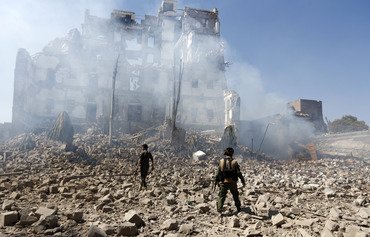Three years after Iran-backed Houthis (Ansarallah) swept into Sanaa, a semblance of normality has returned to the Yemeni capital. But across the war-wracked country a humanitarian disaster is unfolding.
The only Arab capital controlled by an armed opposition movement, Sanaa lives under the constant threat of airstrikes by an Arab coalition fighting in support of the internationally recognised government.
Displaced people have filled the city, the epicentre of a cholera epidemic, and hunger is rife.
The capital is riven by rivalry between the Houthis and allied troops loyal to former president Ali Abdullah Saleh.
Murad, a visual artist who participated in the 2011 protests that drove Saleh from power, said he had dreamed of a "city of peace and freedom".
That hope soon faded when the Houthis advanced from their northern strongholds and seized the capital on September 21st, 2014.
"Between 2011 and 2014, we had a real climate of freedom, a freedom that we had forged with our own hands," Murad said.
"But for the past three years things have changed with the deterioration of living conditions and the return of fear," he told AFP.
"Sanaa today is no longer what it was in 2014. It is a city that lives in the shadow of warplanes and Kalashnikovs."
Hopes dashed
After storming the capital, the Houthis managed to occupy its public buildings in just one afternoon with the support of forces loyal to Saleh.
President Abd Rabbu Mansour Hadi fled to the southern city of Aden, which he later declared the "provisional capital".
The situation worsened when the Arab coalition intervened on March 26th, 2015 in support of Hadi.
"We were hopeful," said Yasser al-Matari, a 24-year-old taxi driver. "But the situation keeps getting worse. Petrol and food prices have risen steadily and wages are no longer paid.
"They (the Houthis) justify it by the state of war, but why do Syrians continue to receive wages when they are at war?"
After the fall of Sanaa, the international airport was closed, the central bank moved to Aden, public services collapsed and prices soared.
Sanaa is gripped by a major food crisis because of a blockade by the coalition, while across the country seven million Yemenis are on the brink of famine.
The streets of the capital teem with children begging for money and food.
In the schools that are still open, the pupils are crammed inside because other classrooms are used as shelters for displaced people or are in danger from air raids because they are occupied by opposition fighters.
A total of 1,640 of the 16,000 schools in Yemen have been closed, leaving 1.8 million children out of school.
An additional 1.6 million children have never attended school, according to UNICEF.
'Biggest humanitarian crisis'
Worsening hygiene conditions have triggered a cholera epidemic in the capital which has also hit several regions of the country, causing more than 2,000 deaths.
"Life for civilians is increasingly harder" with a lack of adequate food, shelter and access to water and sanitation, said an aid worker in Sanaa.
"Yemen is now the world's biggest humanitarian crisis, and it is hit by the most dangerous cholera outbreak, while people are going hungry."
At night Sanaa becomes a city of shadows, dotted with security checkpoints.
Since March 2015, more than 8,400 people, mostly civilians, have been killed and around 48,000 wounded in the conflict.
'Opening for dialogue?'
The Houthis on Thursday staged a defiant rally in Sanaa to mark three years after their takeover of the capital, which is jointly controlled by them and forces loyal to former president Saleh.
The opposition alliance saw unprecedented infighting last month, with tensions spilling over into the streets of Sanaa when a colonel with Saleh's forces and two Houthis were killed in a shootout.
That came after the former president referred to his allies as a "militia", with the Houthis firing back that he was a "back-stabber" and a "traitor".
Saleh's party warned the shootout could push the capital into all-out war, but on September 5th the former president said there was "no crisis and conflict at the moment".
April Longley Alley, a Yemen analyst at the International Crisis Group, said the Houthis and Saleh would likely maintain their alliance as long as the war dragged on.
"Ideological and political differences between the two are real and festering. But they also know that a military split would benefit their enemies," she said.
The recent public rift between the two allies could, however, provide an opening for dialogue, she said.
"Saudi Arabia, in concert with Kuwait and Oman, should call all Yemeni parties to the negotiating table," Alley said.
Otherwise, she said, "al-Qaeda in the Arabian Peninsula and a small group of warlords that span the various fighting factions are the only clear winners."

![This file photo taken on September 21st, 2014 shows armed Houthis as they shout slogans while manning a checkpoint erected after the group seized northern districts of the capital Sanaa. [Mohammed Huwais/AFP]](/cnmi_am/images/2017/09/22/9693-yemen-sanaa-houthis-600_384.jpg)






No armed group can control the state or the government in Yemen without help. The fact that they made their way to the government was with the help of Hadi because he was the interim president at that time. He also supported Affash to stay and escape from legal accountability.
Reply2 Comment(s)
I pray to God Almighty that the Yemen crisis will be resolved as soon as possible.
Reply2 Comment(s)